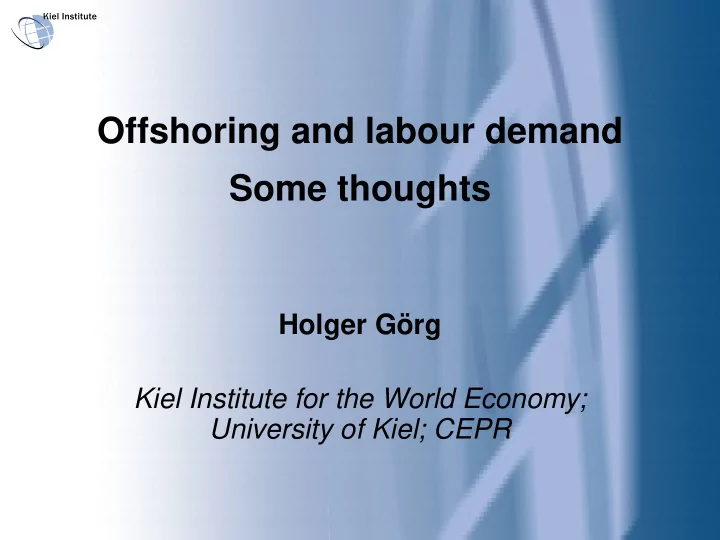

Offshoring and labour demand Some thoughts Holger Görg Kiel Institute for the World Economy; University of Kiel; CEPR
Own recent research • International outsourcing / offshoring of services is beneficial for firms... – increases productivity (Görg, Hanley, Strobl, CJE 2008) – higher innovation / R&D activity (Görg, Hanley, CEPR DP 2009) – results based on firm level data for Ireland, but similar results on productivity for Britain, Sweden, Japan by other researchers. • ... but what happens to workers?
Own recent research • At industry level, outsourcing (of materials) increases relative demand for skilled workers (Hijzen, Görg, Hine, EJ 2005; evidence for other countries) • At worker level, outsourcing of materials in an industry affects individuals – increases wages for high and reduces wages for low skilled workers, but effect is small (Geishecker and Görg, CJE 2008 for Germany; GG WP 2009 for GB; similar evidence for Denmark) – also increases risk of leaving employment for all skill categories (Geishecker, Labour Economics, 2009 for Germany; evidence for DK shows only low skilled affected)
Own recent research • Services outsourcing affects workers in similar ways (GG WP 2009 for GB), but magnitudes are larger than for materials outsourcing • Tasks matter (Baumgarten,Geishecker,Görg 2009) – Low skilled workers with high degree of interactive tasks or non-routine tasks benefit from services or materials outsourcing (others do not) – High skilled workers always gain from services outsourcing (no effect of materials) but gain more the lower is interactivity or non-routine index
What remains to be done? • What is the comparable evidence for other countries? – Availability of micro data sets for many OECD countries – Outsourcing measures are calculated from trade statistics and/or input output tables (available for OECD countries) – Incentives for doing „replication studies“...
What remains to be done? • Using micro data is important to account for heterogeneity... • ... but it is also important to get the „macro picture“ of aggregate effects, also for comparisons – move from micro to macro results – use internationally comparable micro data sets – generate comparable „meta data“ at industry level (e.g., on employment, wages, worker characteristics by industry) – use these in a common empirical model
What remains to be done? • Observed vs. potential outsourcing – potential outsourcing may be important for bargaining over employment and wages, even before it is realised – measurement of potential outsourcing difficult • Based on historic values • Broad approach using tasks (Blinder, OECD, Laaser and Schrader...) • Needs to take into account inshoring as opposing force (intra-industry trade in services) – think about how this affects bargaining processes at the firm and industry level
What remains to be done • Think more about relevance of tasks – big issue theoretically (but is this really new?) – what is the relationship between tasks and skills, and tasks and industries/products? – how do wage and employment effects differ by tasks? – what is the optimal range of tasks? – availability of detailed data on tasks that are internationally comparable and vary over time
What remains to be done • How / where does the adjustment to outsourcing take place? – Some industries contract, others expand – Some activities / firms in industries adjust – Firms adjust activities – What happens to workers in firms? – Use linked employer-employee datasets (LEED) – Practical difficulties / legal impediments for some countries to construct such data by linking different sources
Overall • From a policy perspective, need to have internationally comparable conclusions • Bringing together researchers to exploit micro data in a consistent way should be fruitful
Recommend
More recommend